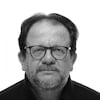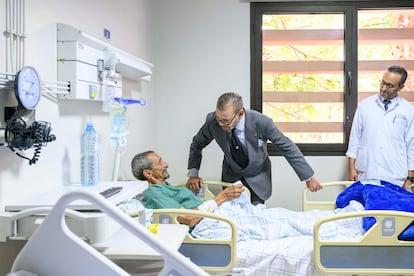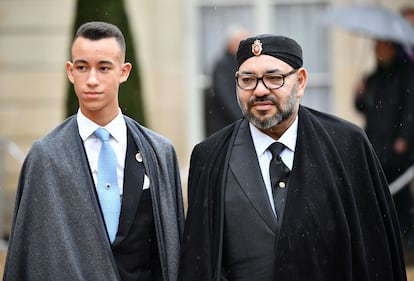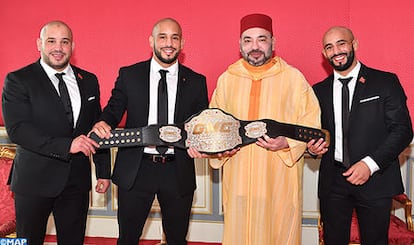Mohammed VI, a silent king with far-reaching powers
The recent earthquake in Morocco highlights the do-nothing policy of a monarch who undertook major reforms in his early years, but who is now criticized for his prolonged absences from the country


Mohamed VI was in his mansion near the Eiffel Tower in Paris, where he had arrived a week earlier on a private visit, the first he had made this year to the French capital, when a cataclysm shook the High Atlas at eleven minutes past eleven on the night of September 8. A few hours after the 6.8 magnitude earthquake that devastated dozens of villages in the foothills of the mountain range — in one of the most impoverished areas of Morocco south of the flourishing tourist city of Marrakech — the death toll stood in the hundreds. Today it is around 3,000.
On the afternoon of September 9, the monarch of the Alawite dynasty had returned to Rabat to chair a crisis meeting of the cabinet at the Royal Palace, which limited itself to putting out a statement with a photograph of the event. The sovereign did not address his people. Three days later, Mohamed VI visited several people injured by the earthquake in a hospital in Marrakech. In images from the state television channel SNRT he was seen kissing and hugging some of them and donating blood on a stretcher. But his silence continued. And 48 hours later he again led a session in Rabat for work on the reconstruction or repair of more than 50,000 homes affected by the earthquake, that the Royal Palace reported, but which came without a message from the king.

Unlike his father, Hasan II, who reigned between 1961 and 1999 and liked to make statements to the cameras, Mohamed VI only speaks in public four times a year. On the anniversary of his enthronement; on the day commemorating when his grandfather, Mohammed V, went into exile; at the annual opening of Parliament, and to commemorate the beginning of the Green March of hundreds of thousands of Moroccans on Western Sahara in November 1975, then under Spanish colonial administration. Coinciding with his 60th birthday, on August 21, he cut the second of his traditional annual speeches this year. His last face-to-face interview with a media outlet — with EL PAÍS, to be exact — dates back to 2005.
Mahi Bibendine, writer, painter, sculptor, and social activist, from Marrakech, says: “I am not exactly close to the state or the monarchy, but the reality is that the king has been managing the crisis.” His father was a entertainer at the court of Hassan II for more than three decades. His brother Aziz, a young Army officer in 1971, participated in a coup d’état and spent 18 years in the dungeons of Tazmamart, in southern Morocco, barely seeing the light of day. The author of The Horses of God, a novel that evokes the jihadist attacks in Casablanca in 2003, also went into a cultural exile in Paris and New York after the Years of Lead — a period marked by state violence and repression against political dissidents — suffered under the father of the current monarch.
“I have not seen a humanitarian movement of this magnitude in Morocco,” he explains at his home on the outskirts of Marrakech a week after the earthquake. “But it is clear that power is too centralized in the figure of the king. Everything passes through his hands in a pyramidal structure. That is the drama of this country. No one has dared to visit those affected by the earthquake before the sovereign. In that sense, Morocco has not changed.”
His opinion is largely shared by the novelist Tahar Ben Jelloun, who described the ordeal of the Bibendine’s brother and other detainees at Tazmamart Prison in his work This blinding absence of light. “Mohamed VI is someone who works a lot but speaks very little,” the author who won the Goncourt Prize in 1987, told France Presse. “The king has full powers over everything that happens inside the country, over the army, over life-or-death issues,“ he clarifies, “but he also has to set the ball rolling.”
Mahi Bindedine warns: “Like the rural population of the Atlas Mountains, there is a forgotten Morocco that has sometimes rebelled, as has happened in the Rif (north), which is sometimes hostile to central power. There are as many or more Moroccans who live in the countryside than those who live in the cities.”
Mohammed Mohua, an activist in the nationalist left of the Rif, remembers that in the Al Hoceima earthquake of 2004 the state also took more than four days to mobilize in the rural area of the province. “The Moroccan state, as it is configured — halfway between an authoritarian regime and the transition towards democracy — ends up paralyzed while waiting for the king to make decisions,” he says.
Turn ‘towards an authoritarian model’
“The figure of the king is highly valued by Moroccan society and is held in high esteem. Nobody questions him,” says Mohua. “The reform of the Mudawana [Family Code] in favor of women and the Equity and Reconciliation truth commission on the Years of Lead were steps forward,” he acknowledges, “but after the Casablanca attacks and the Al Hoceima earthquake the state turned towards an authoritarian model.” “The royal Cabinet, the king’s trusted men and former classmates, are the ones who now carry the weight of the decisions from the Royal Palace,” the activist says.
Since his ascent the throne in July 1999, the king has been at the center of the state due to his broad executive powers, through which he reserves direct control over defense, security, and diplomacy. The same is true for Islamic affairs, in his capacity as commander of believers.

Millions of euros, the largest fortune in the country, is concentrated in sectors such as banking, construction, tourism, and commercial distribution. His luxurious private mansion in Paris cost him around €80 million ($85.5 million) three years ago.
In 2022, Mohamed VI spent more than six months — four of them in Paris — outside Morocco, and nearly three months at his residence in Gabon at the beginning of 2023. This year, the king has enjoyed a long domestic summer on the Rif coast, where he began in his residence in Mdiq, about 30 kilometers south of the Spanish exclave of Ceuta, and in Al Hoceima, also on the Mediterranean coast. Now, international media such as The New York Times and Le Monde have highlighted the slowness of the monarch’s political response to the catastrophe.
Three fighters, regular companions of the king
The national press has not reported this year, as it did in 2022, on the presence among the royal entourage of three German brothers of Moroccan origin said to be close friends of the king. Abu Baker Azaitar, a 35-year-old wrestler; his 31-year-old brother Ottman, also a wrestler; and Omar, their coach, became friends with Mohamed VI in 2018. Since then, they have been regular companions on his vacations.
In almost 25 years on the throne, Mohamed VI has consolidated diplomatic advances in his country’s favor, such as those that led to the recognition of its sovereignty over Western Sahara by the United States (in December 2020) and by Israel, in July this year. He has also managed to get Spain, the former colonial power, to support the principle of limited autonomy for the region — 80% of which is currently under Moroccan administration — as “the most serious, credible, and realistic basis for the resolution of this dispute.” This is compared to the option for full independence put forward by the Algerian-backed Polisario Front, which controls the remaining 20%, according to the United Nations. In 2016, Mohamed VI also undertook a strategy to reintegrate his country into the African Union, which his father, Hassan II, abandoned in 1984 after it admitted the Sahrawi Arab Democratic Republic proclaimed by the Polisario Front.
The transformation of the north African country since 1999 is evident in the modernization of infrastructure such as the highway network, the Tangier-Casablanca high-speed train, and the Tanger Med superport in the Strait of Gibraltar. These are complemented by the development of leading industry sectors, such as automobile assembly, and the expansion of Moroccan banking, insurance, and telecommunications companies into other African countries.
In parallel with the emergence of a middle class in large cities, economic and social inequalities have not stopped growing among the disadvantaged rural population and the urban peripheries. The New Development Model report, commissioned by the king in 2019, upon completing two decades of his reign, revealed a “worsening of inequality” by reflecting that the wealthiest 10% of the population hoarded 11 times more wealth than the poorest 10%. The illiteracy rate stands at 24%, and 77.3% of Moroccans work in the informal economy, according to World Bank data.
Faced with the winds of change of the Arab Spring, the Alawite sovereign accepted the demands of the February 20 Movement 12 years ago, which led to the promulgation of the 2011 Constitution. The 2011 entry into power of the (islamist) Party of Justice and Development, which has remained at the head of the government for a decade, resulted in setbacks to the reform of the Family Code, through exceptions to the rule that have allowed the marriage of more than 13,600 underage women in 2022, despite the legal prohibition of the practice.

Press freedom squeezed
The freedom of the press has also receded following advances in the early years of the reign of Mohamed VI. Morocco now ranks 144th in Reporters Without Borders’ list of countries with regard to this fundamental right. In July 2022, the New York-based NGO Human Rights Watch published a report documenting the “gag on the opposition” imposed by those in power.
“With Mohamed VI, Morocco began to open up and I returned to the country,” says Binbedine. “Then the system was closed again, but it no longer has anything to do with the Years of Lead under Hasan II. The constitutional reform in 2011 reduced the king’s powers, although it has not been applied in practice,” laments the writer and painter. “We may have to wait for the crown prince, Moulay Hassan, to reign. In Morocco, changes occur very slowly,” concludes Binbedine, who is actively participating in the civil society movement to help those affected by the earthquake. “I have seen the great resilience of Moroccans. Despite their sadness, they smile at those who come to help them.”
At the end of his winter vacation, Mohamed VI returned to Morocco from his residence in Gabon, which coincided with the beginning of the Muslim holy month of Ramadan. The sovereign interrupted his break to make an official visit on February 15 to the capital of Gabon, where he appeared noticeably thinner for the first time. Then he was forced to cancel his official trip to Senegal at the last minute, for health reasons. The monarch underwent heart surgery in 2018 and 2020, although the state of the king’s health is not usually addressed in statements from the Royal Palace or by the Moroccan media.
“The 2011 Constitution is still too big for the political parties, which do not know how to develop citizen participation in public life,” says Mohammed Mouah from Al Hoceima, from where he sends humanitarian aid to the provinces of the Atlas devastated by the earthquake. “With exceptions such as the Moroccan Association for Human Rights, humanitarian NGOs are now being directed by those in power. In recent years, civil society had kept quiet. Now it has expressed its community spirit,” he sums up.
Sign up for our weekly newsletter to get more English-language news coverage from EL PAÍS USA Edition
Tu suscripción se está usando en otro dispositivo
¿Quieres añadir otro usuario a tu suscripción?
Si continúas leyendo en este dispositivo, no se podrá leer en el otro.
FlechaTu suscripción se está usando en otro dispositivo y solo puedes acceder a EL PAÍS desde un dispositivo a la vez.
Si quieres compartir tu cuenta, cambia tu suscripción a la modalidad Premium, así podrás añadir otro usuario. Cada uno accederá con su propia cuenta de email, lo que os permitirá personalizar vuestra experiencia en EL PAÍS.
¿Tienes una suscripción de empresa? Accede aquí para contratar más cuentas.
En el caso de no saber quién está usando tu cuenta, te recomendamos cambiar tu contraseña aquí.
Si decides continuar compartiendo tu cuenta, este mensaje se mostrará en tu dispositivo y en el de la otra persona que está usando tu cuenta de forma indefinida, afectando a tu experiencia de lectura. Puedes consultar aquí los términos y condiciones de la suscripción digital.








































